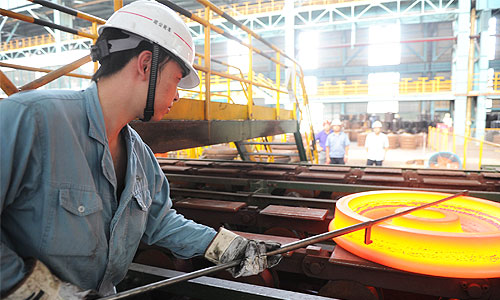|
 |
|
RUNNING TO EUROPE: An employee works on a train wheel production line in Maanshan Iron & Steel Co. Ltd. in Anhui Province. The company's train wheels won German quality authentication earlier this year and have been exported to the EU market (WANG LEI) |
An analytical report released by China Orient Fund Management Co. Ltd. (Oriental Fund) said among the six major industries where M&A is encouraged, the iron and steel, cement and electrolytic aluminum sectors have excess capacity and a low industrial concentration, and will require large amounts of capital. This may be easy for foreign companies with deep pockets, but private capital looking to participate should first consider their own development and financial capacity before getting involved.
Fiscal support
The State Council's announcement requires commercial banks to develop M&A credit businesses in an active and sound manner, expand credit scales and fix credit terms. General credit will be granted to companies after M&As are complete, the announcement stated.
The decision also encourages securities companies, asset management companies, equity investment funds and industrial investment funds to participate in corporate M&As and provide direct investment and other forms of financial support. The Orient Fund's report said financing channels will be increased for companies involved in M&A deals.
Support for qualified companies to finance M&As will be conducted by issuing stocks, bonds and convertible bonds, and encouraging listed companies to expand financing channels for M&As through stocks, cash and other innovative payment schemes.
Debt issues related to M&As must be properly dealt with in accordance with related laws and regulations. Asset management companies, venture capital companies, equity investment funds and industrial investment funds will also be encouraged to deal with debts of companies being merged.
Obstacles to tackle
A review of M&A cases in the past shows that local governments have resisted trans-regional M&As.
Local governments, the State Council announcement stated, should abolish unfavorable measures toward M&As, especially those that restrict companies based in other regions from acquiring local companies. By straightening out the relations among regions, governments at the local level can share the benefits multiple M&As have to offer.
According to measures released by the Ministry of Finance (MOF), the State Administration of Taxation (SAT) and PBC in 2008, 25 percent of payable taxes by corporate headquarters and branches should be allocated among the branches in various localities in different proportions. This policy is being considered to get to the root of trans-regional M&A problems, said the Orient Fund report. As a result, even after a company has been merged or acquired, it may still need to retain branches and subsidiaries to realize any substantial profit.
Although the announcement did not clarify the profit-sharing proportions among different regions, the profits and tax revenues generated by the acquired companies may be shared 50-50 by local governments of the acquiring and acquired parties. However, the detailed sharing proportions will need to be ironed out by related departments.
Departments involved
To implement the M&A work as soon as possible, the State Council's announcement has created a detailed division of responsibilities. Twelve departments so far have been given oversight on policies related to taxes, financing and land to coordinate the governments and companies in different regions.
The PBC and China Banking Regulatory Commission will be responsible for encouraging commercial banks to develop M&A credit businesses and support transnational M&As. The Ministry of Commerce is responsible for the operations of companies that need to be merged or acquired. The MIIT is responsible for abolishing obstructions to M&As and relaxing market access for private capital. Promoting market-oriented reform, implementing preferential policies for M&As, supporting personnel-related issues in SOEs, among other tasks, will be delegated to other ministries (commissions) and regulatory bodies.
Feng Wei, an analyst with Huatai United Securities Co. Ltd., said with assistance from the dozen government departments, the M&A process would be accelerated within the year. | 